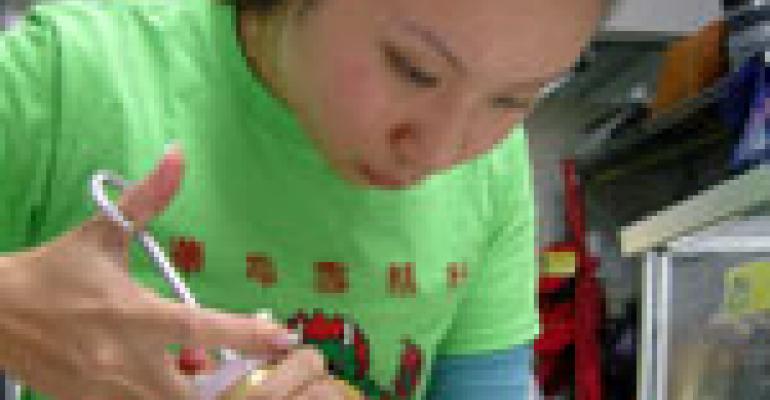NEW YORK Mike D from the Beastie Boys sported a red t-shirt with a green dragon licking an ice cream cone to the 2006 VH1 Hip Hop Honors. A regular customer of the Chinatown Ice Cream Factory here, he posed for a Wired Magazine cover photo in the shop’s yellow dragon tee.
The buzz about the Chinatown Ice Cream Factory is a relatively new phenomenon that co-owner Christina Seid is trying to infuse into the 30-year-old shop that her father founded. As one of the youngest female business owners in Chinatown, 27-year-old Seid is branding the ice cream shop in modern, innovative ways that attract sweet teeth from beyond the lower Manhattan neighborhood.
The Chinatown ice cream parlor — where lychee is the most popular flavor — draws a clientele from all over the city curious to taste the unconventional flavors. Nearly 50 percent of the shop’s customers are non-Asian and celebrities like actress Cynthia Nixon are known to stop by for a scoop, Seid said. Restaurants throughout Manhattan such as the Noodle Bar and Ginza order ice cream at wholesale prices from The Chinatown Ice Cream Factory.
Phil Seid, Christina Seid’s father, founded the business at 65 Bayard St. in New York as a restaurant with one of his brothers in 1977 and ultimately grew the business into an ice cream shop with another brother, who died in 2004. It was then that Christina Seid decided to join her dad as co-owner of the store.
As a child, Seid never even considered taking over her dad’s business. Chinese kids generally do not want to take on the $4 dumpling shops or similar small businesses that their parents started, as they are not seen as sophisticated or lucrative career choices, Seid said
“I always wanted a 9-to-5 job growing up because I understood the struggles of a small business,” she said. “The ‘opportunity’ to own the business seemed more like an ‘obligation’ at the time.”
After graduating from the University of Rochester in 2002, Seid attended Queens College and earned her master's in education. After teaching for a few years while watching the store become increasingly busy in a safer and more popular Chinatown, she joined the family business.
“When the ice cream business started taking off, it just seemed like a perfect opportunity for me to be involved in the family business while staying active in other nonprofits in the community,” she said.
Running the ice cream store in Chinatown enables Seid to engage into her inner entrepreneur. She stores a bag of business magazines behind the freezers in the ice cream shop that she reads to develop new marketing ideas for the store.
Creating a website in 2004 and a blog about Chinatown are two of the marketing strategies that Seid has used to boost business. Customers can read reviews and place orders for t-shirts and ice cream cakes on the website, in addition to over the telephone or in person in the store. The website also features photos and press clippings about the shop.
In addition, Seid uses the website to incorporate ice cream flavor requests from customers into the daily ice cream selection. Flavors like durian, black sesame, egg custard and zen butter are all new to the store since Seid joined the partnership. She says that while her dad was originally hesitant to sell the exotic flavors, they are now among some of the most popular.
Seid is also hoping to boost awareness of the ice cream shop and the neighborhood as a whole with her recently published multicultural children’s book, “Saturdays in Chinatown.” The story is told through the eyes of an 8-year-old Chinese-American kid who lives in the suburbs and explores his heritage on the weekends in Chinatown with his family. The bilingual book that introduces Chinese-speaking and English-speaking readers to the community is Christina Seid’s effort to generate more foot traffic into the community while breaking Asian-American stereotypes.
“Oftentimes, Asian-Americans are depicted as having slanty eyes, yellow skin and they are exoticized,” said Seid said. “This book is just to show people that we are just like everyone else and one of the best ways to stop these stereotypes is at a child’s age.”
As a member of Asian Women in Business and Project by Project, Seid has a passion for helping other businesses and causes within the community — and it all makes good business sense. If the neighborhood and its businesses languish, the ice cream business melts along with them.




